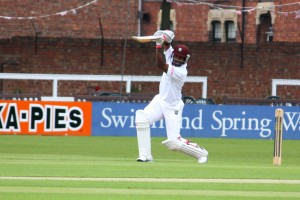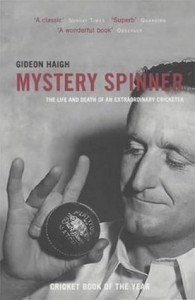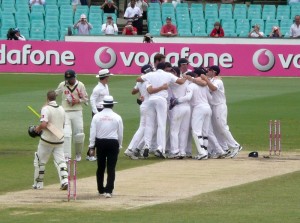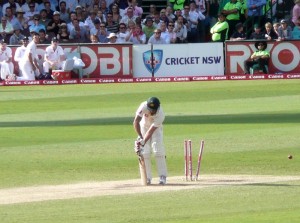Archive for the ‘australia’ Category
Wednesday, June 27th, 2012
In terms of eloquence, it was never going to match Kumar Sangakkara’s wonderful tour de force last year, but Tony Greig’s Spirit of Cricket Cowdrey Lecture certainly pulled no punches when it came to India and its influence on the world game.
In a room filled with cricket’s great and good and redolent with the smell of smoke from burning bridges by the end of it, Greig’s forty-minute speech used the word “India” fifty-two times in total as he took the BCCI to task for its self-interest and greed and for pursuing a policy bent purely on the maintenance of power and of getting one over on its erstwhile colonial oppressors.
“India is preoccupied with money and Twenty-20 cricket, and sees its IPL and Champions League as more important than a proper international calendar,” he said. “To compound the problems, India has not only sold part of the game to private interests but some of her administrators are seen to have a conflict of interest, which makes it more difficult for it to act in the spirit of the game… The net result of this is Test cricket is suffering… We can huff and puff as much as we like and have all sorts of external reports but this situation can only be resolved by India accepting that the spirit of cricket is more important than generating billions of dollars.”
Strong stuff, but after the initial collective thud of jaws dropping you got the feeling there may have been one or two heads in the room nodding in agreement.
He also took aim at the BCCI’s resistance to umpiring technology, its “indifference” towards anti-doping and corruption and problems which “could be resolved if India invoked the spirit of cricket and didn’t try and influence its allies in how to vote”.
Greig, of course, isn’t the first to criticise the Indian board for its selfish lack of interest in the wellbeing of the sport – Lawrence Booth issued a reminder to the BCCI not to abuse its “special gift: the clout to shape an entire sport” in his notes to this year’s Wisden Almanack – but no-one does “damn the torpedoes” quite like Tony Greig, and whether he will ever be invited back to India for a commentary stint in the future is anyone’s guess. You might think it, but Tony will damn well say it, and let’s be honest, many of us agree with him that India’s control of the sport at the highest level is deleteriously disproportionate.
Having said that, there is something slightly incongruous about a man taking a cricket board to task for its blatant commercialism, and the damage caused by government interference in the sport, when, as “tourism ambassador” for Sri Lanka, he managed to shoehorn a thinly-disguised advert for a hotel into his commentary during England’s recent Test series there. He also, unfortunately, joins the ranks of those bamboozled by bullshit and bad science in dragging up that long-discredited old chestnut of lie-detector tests to root out corruption. That and the fact that Greig – the man who was involved in the notorious 1974 runout of Alvin Kallicharran – was the man delivering the speech, and Stuart Broad – a man who thinks every lbw he goes up for is out, and when he is batting he never is – was involved in the panel discussion afterwards, might have made you do a double-take on seeing their names attached to a “spirit of cricket” lecture.
Anyway, whether or not you agree with what Tony Greig had to say, his speech was certainly not dull, and you can read the full transcript at the Lord’s site.
===
And so we come to that part of the year when students the length and breadth of the country are goggle-eyed through too much revision and Red Bull, and the “mid term report” metaphor gets trundled out and applied to England’s performance halfway through the international summer. The consensus seems to be Team England haven’t just performed with flying colours so far, but are on course for an A+ grade by season’s end.
Let’s not get carried away. The West Indies series was less a prelim than an open-book exam; for all our fervent hopes that the Windies would present England with some semblance of a challenge – and that’s not being patronizing though it’s easy of course to be magnanimous when you’re winning – a competition never really materialized. Comprehensive victories by England were expected in the Tests, but less so in the ODIs and certainly the T20 match last Sunday was expected to provide a more level playing field, but only served to highlight the Windies’ frailties. Last time the West Indies visited England it was Shiv Chanderpaul who was the side’s star; this time around Marlon Samuels won cult hero status – that doughty, crease-occupying 76* at Trent Bridge showed how much he has matured as a Test batsman. Tino Best provided some entertainment as well, and you’d have needed a heart of stone not to feel for him when at Edgbaston he fell just 5 runs short of the first century by a no. 11 batsman. But the team never really clicked as a unit, and in the case of offspinner Sunil Narine, preceded by a large amount of hype on the back of 24 wickets in the IPL, there was only disappointment and a distinct lack of the “mystery spin” we were promised, though conditions weren’t exactly beneficial for him.
It’s infuriating when there’s a missing ingredient that stops true potential from coming to fruition and producing success, but from a Leicestershire fan’s point of view it was nice to get a glimpse of that potential when the Windies played a tour match at Grace Road and Darren Bravo, who never really fired in the Tests but made 66 against Leicestershire, gave all of us watching a reminder of the beautiful strokeplay that brings out those Brian Lara comparisons.
 Darren Bravo at Grace Road England now face Australia in a series of five ODIs, starting on Friday, and while Bill Lawry might be taking things a bit far in trumpeting Australia’s seam bowling attack as the best in the world, they’re sure to provide a far stiffer examination, and better preparation for facing a South African squad that looks, quite frankly, intimidating in its strength and depth.
===
I’m aware that this post is starting to resemble a smorgasbord, or a salmagundi if you will (hodgepodge if you want to be less charitable) but it’s a been a mixed fortnight in terms of cricket news, from the tragic (the passing of Tom Maynard) to the ridiculous (Andrew Flintoff’s reference to Mike Atherton as a “fucking prick”) and the downright predictable (yet another kiboshing by the BCCI of a move at ICC Board level to make the decision review system mandatory across the board).
Tom Maynard’s sad death deserves more than just a footnote, but as yet it’s hard to make sense of the sequence of catastrophic events that led to a talented young cricketer being hit by an underground train in the early hours of Monday, June 18th. What made the news harder to take in was the fact he’d only been on television a couple of days before, talking about a future which he was hoping would involve playing for England.
Last week I wrote my own tribute to another bright light that was snuffed out too soon for World Cricket Watch on my favourite cricketer, Victor Trumper. Trumper accomplished much in his short life before he was taken by illness at the age of 37. With Tom Maynard, only 23, we will never know what he could have gone on to achieve. We like to believe that life, most of the time, and discounting the odd random variable, is something we can more or less control. But when events like this happen, everything we think we know about the natural order of things is thrown into chaos; death becomes, in the words of writer Edward St. Aubyn, “a scandal, a catastrophic design flaw; it ruins everything”.
Rest in peace, Tom.
Thursday, January 5th, 2012
There is no sport in which sentimentality coexists with commercialism so closely, and at times so uneasily, as cricket. A Test match can play to near empty stands, and still have a large contingent of purists fretting over its continued existence; T20 is seen as its uncultured, uncouth offspring, the kid who threw away a university scholarship to go on the X Factor and is knee-deep in money, cheerleaders and rock and roll.
Success in sport means moving with the times. It is why Test cricket now uncomfortably straddles the line between traditionalism and an uncertain future, not knowing whether it wants to go forward or back, and why in building a successful cricket team pragmatism must take precedence when it comes to retiring the old guard and making way for new blood.
It is mission accomplished as far as England and Andy Flower are concerned: England sit at the top of the Test tree through the fortuitous butterfly effect of KP’s bust-up with Peter Moores, and a perfect synergy between Flower and captain Andrew Strauss. Both Australia and India are fighting their way through a period of transition, with both facing accusations of sentimentality for not putting their old warhorses out to pasture.
One warhorse who, in the view of many, should have had his passage booked to the knacker’s yard months ago is Ricky Ponting. The first suspicion of reverent sentimentality on the part of Cricket Australia came when he did not retire immediately after losing the captaincy, but was pushed down to number four in hopes he would rediscover his form. Two schools of thought can be ascribed to this: the first being that any possibility at all of a return to his imperious best was worth persevering for, and the second, and most likely, that no one wanted to be the one to swing the axe on a great career, and that if the failures persisted for long enough, Ponting would do the decent thing and retire himself.
You make a rod for your own back when you have achieved as much as Ricky Ponting has. Anything less than excellence means failure. The fact you scored your last hundred back in January 2010 – never mind that you have scored ten half-centuries since then – is failure. Your 78 against New Zealand at Brisbane this year still won’t be enough to silence the critics. The skill in being a success at parties is knowing when to leave. People are saying you are finished. You need to bow out gracefully, to make way.
Or, you could say screw all that, smile and nod and grit your teeth and keep your head down and do it the hard way, throwing yourself through the dirt in one of the most desperate singles you’ve ever taken, and, spitting out bits of the SCG wicket and with mud on your shirt, raise your bat to the pavilion in cricket’s version of the one-fingered salute to celebrate your 40th Test hundred.
This was more than just a fuck-you hundred to the critics calling for Ponting to be dropped. Comebacks like this are the culmination of the moment you realise that, when you get to this stage in your career, your biggest opponent is yourself. The engine of your talent is still what drives you; but the workings need a bit more TLC than they used to. Like a vintage Patek chronograph, the hallmark and craftsmanship remain unmistakable, but the timekeeping might no longer be as precise; the inner workings will need cleaning, dismantling and, in some cases, replacing.
Ponting, interviewed after a roll-back-the-years 134 – in which the swivel-pull made a triumphant return with all the fanfare of a conqueror marching into a city – acknowledged that he has had to return to basics: “There were a few technical aspects of my game which I have been doing and which have now paid dividends. It’s all starting to come back. There’s rhythm about my batting again.”
Presumably – hopefully – now that the mechanism has been given a good old winding in that Sydney innings, he can continue keeping good time now for another year, another eighteen months, even. He will wind down eventually, to the extent where nothing will restart him, but that day is not yet.
Today, all the talk was of captain Michael Clarke’s historic triple-century. Tomorrow, all the talk will be about Sachin Tendulkar’s success or failure in chasing down that still-elusive hundredth hundred.
That all of this should, to a certain extent, overshadow the achievement of Australia’s ex-captain is understandable.
But that new shirt Ponting changed into after raising his bat was probably more symbolic than the dive through the dirt: clean shirt, clean sheet, renewed confidence, clean start.
Thank god for sentimentality.
Sunday, November 13th, 2011
On Thursday, Africa’s Western Black Rhino was officially declared extinct.
On the same day at Newlands cricket ground, 23 wickets fell, proving that Test cricket is thankfully still alive and kicking.
A decent pitch combined with incisive bowling and scatterbrained batting led to a veritable stampede of stats as milestones were passed and reputations tumbled along with the timber. South Africa’s first innings total of 96 was the second-lowest since their readmission to Test cricket; Australia’s 47 all out their fourth-lowest ever and lowest against South Africa. Nathan Lyon’s 14 is only the eighth time a number 11 has top-scored in an innings. Not since 1924-25 have more than 22 wickets fallen in a day’s play; Shane Watson took the second fastest 5-wicket haul, in 21 balls. Vernon Philander, on debut, left Australia with nowhere to hide: his match haul of 8-78 comprises the 5th best bowling figures by a South African in his first Test.
After all of this excitement, Hashim Amla’s elegant, wristy drives through cover and down the ground provided a much needed come-down as he and Graeme Smith calmly saw South Africa home just before lunch on the third day.
Test cricket is magnificent, awe-inspiring, and it deserves saving. But like all endangered species, it needs some help.
Poachers and loss of habitat did for the Western Black Rhino, and Test cricket similarly faces the threat of endless ODI series encroaching on an already packed international timetable and the proliferation of T20 tournaments dangling the big-dollar carrot in front of cricketers for whom the choice to represent their country would otherwise be an easy one.
The format also needs to help itself – over-priced tickets, lifeless wickets, poor viewing conditions and the spectre of empty stands are just some of the things not helping Test cricket’s cause. That a love for the highest form of the game should ever be equated with purist “elitism” in contrast with its more populist forms would comprise not just a dumbing down of the entire sport but a failure of duty in the protection of its long and rich heritage.
What is also plain is that Australian cricket, after the phoenix-like attempt to rise from the Ashes that was the Argus review, must adapt or die. Captain Michael Clarke called the shot selection of his batsmen “disgraceful” and “horrendous”; his own fine innings of 151 he called “useless, a waste of time” in the context of his team’s defeat (a refreshingly honest admission, compared to Alastair Cook’s fatuous assertion that England are “getting close to where we need to be” after India’s 5-0 ODI whitewash).
Ricky Ponting’s career decline looks to be terminal; Brad Haddin is a lame-duck choice for keeper with the likes of Tim Paine and Matthew Wade waiting in the wings; and surely it must be time to knock the Mitchell Johnson experiment on the head: he is the strike bowler Australia want but who rarely turns up. A cull for the good of the herd is very much in order. Not that this should mean a slavish over-insistence on youth – Mike Hussey still has runs in him, and regardless of what you may think about Simon Katich’s handling of his dropping by Cricket Australia, Phillip Hughes’ continued ineptitude at the top of the order must surely increase your sympathy for him.
Those extraordinary events at Newlands were a perfect storm of individual weaknesses and standout performances distilled into one day. That the next match in this Test series should provide the amount of excitement we saw at Cape Town is unlikely. The fact that it is the last in a mere two-match series is criminal. Test cricket deserves better and the message to the boards and administrators is simple: don’t let this beautiful animal die.
Tuesday, March 22nd, 2011
England: you unpredictable, inconsistent, crazy, mad bastard of a side.
I’d come to terms with the fact they’d be going out of the World Cup in the group stages. I was sad but resigned. Hell, I was even taking a leaf from Michael Vaughan’s book and looking for the dreaded “positives”.
Bowlers who needed a rest. A big summer of cricket to prepare for: Sri Lanka in May, India in July. And England still have the Ashes. ODIs – well, who gives a shit about them anyway.
And yet. Part of the deal that comes with being an England fan is you pretend not to care. You are punch-drunk with continual beatings and shambolic performances to the extent where you find solace in criticism. A good rant can be therapeutic. It’s healthier than turning to drink.
And yet somehow we’ve come through all that, and hope – thankfully – has a habit of springing eternal.
There were a couple of results that needed to go England’s way, but they helped themselves by beating the West Indies in a match which was in turns infuriating, bizarre, topsy-turvy and finally, heart-stopping.
“Do you enjoy captaining this England team?” Andrew Strauss was asked at the post-match presentation. “No,” was his commendably direct answer. Let’s hope England afford Strauss a little more job satisfaction at the Premadasa, where they will face Sri Lanka on Saturday.
And let’s also hope England win the toss, because 66 per cent of the day-nighters that have been played at the ground have been won by the team batting first.
Whether or not James Tredwell and Luke Wright will be retained after their match-winning efforts against the Windies remains to be seen. I’d like to think Strauss’s selection process will be guided more by cold logic than sentimentality, but it would be difficult to drop these two after they saved England from an early flight home.
Nevertheless, Sri Lanka, with dynamic opening duo of Tharanga and Dilshan and double class-act of Sangakkara and Jayawardene, will be the overwhelming favourites. England are more battle-weary than battle-hardened, and while all the quarter-finalists have shown chinks in their armour, England’s looks less like it has chinks in it than it looks composed almost entirely of rusty old frying pans and welded together by some bloke called Dave in a south London chop-shop. Whether this will be enough to see off the likes of Ajantha Mendis, Lasith Malinga and some chap called Muttiah Muralitharan is anyone’s guess – because really that is as accurately as you can forecast an England performance these days.
But, somehow – defying logic, common sense, and the form-book – England have made it this far. Any match from here on could prove to be the final curtain, but given their gloriously roller-coaster campaign, at least they can say they did it their way.
Before that, though, there is much to look forward to. Pakistan versus the West Indies should be gloriously anarchic; we will most likely be waving farewell to the boys from the land of the long white cloud; and Australia will be out for blood against the mighty India in the wake of their defeat by Pakistan and the rumours that say Ricky Ponting’s days as captain are numbered.
It’ll be a surprise if anyone other than South Africa, India, Sri Lanka and Pakistan go through to the semi-finals, but in a World Cup that’s proved vastly more entertaining than its 2007 counterpart, none of this should be regarded as being set in stone.
Tuesday, February 8th, 2011
England’s run-chase at Perth ended 57 runs short, with Jimmy Anderson skying a top edge that plopped obediently into the gloves of Brad Haddin. And so this interminable ODI series ended, with a tired whimper of the “please make it stop” variety.
If ever England needed a salutary reminder that Australia are better than they are at the one-day stuff, this was it. But on the evidence of this Chinese water-torture of a series, that really isn’t saying much. While the hosts may have won 6 games to England’s solitary Australia Day victory at Adelaide, the standard of cricket on show from both sides was – with the exception of isolated individual performances – pretty damned excruciating.
In terms of England’s preparation for the World Cup, this series seems to have achieved nothing aside from crippling half the team, muddling team selection, and filling us all – players and fans alike – with a leaden sense of weariness at the prospect of a World Cup tournament that presents more of a chore than a challenge.
And that is just the start of a crazy, fucked-up international schedule more over-crowded than a Mumbai commuter train and dreamt up by some sadistic lunatic at ICC Towers yelling “more cowbell” while manically trying to shoehorn yet another meaningless one-day series into the one or two gaps left on his “Future Tours of Doom” spreadsheet.
I’m as guilty as the next man who, on waking up at some godforsaken time in the morning, wistfully ponders the possibility that there must be a cricket match going on somewhere in the world, and is duly rewarded with the thrill of impatiently stabbing the refresh key on a sporadically-updated scorecard of Ireland vs. an Uzbekistan XI. But then I’m not the one who has to schlep round the world doing this for a living while being spared the odd couple of days reacquainting myself with the wife and kids who have forgotten what I look like before I jet off half way round the world for the next tournament.
It is very easy to react with scorn, as many do (Ian Botham, to name but one) to players’ fears of burnout. “Whining, overpaid bunch of prima donnas”; “playing for one’s country should be a privilege”, etc, etc.
But this is ignoring the bigger picture – one of quantity over quality, of TV rights and quick-fix entertainment, of players burning twice as brightly but only half as long before their ailing, over-extended bodies land them on the international scrapheap, or – worse still – depriving us of young talent that needs time to bloom, and, in cases of injury, to heal.
Eoin Morgan is a case in point. Disappointing in the series just gone, he will now not play a part in England’s World Cup campaign due to a broken finger sustained during the 4th ODI in Adelaide. That he continued playing must have been not only through the determination to play through any discomfort in the belief the injury was not serious, but surely, it must also have been motivated by the biggest fear a young player can have: that of being dropped from the team. As it turns out, the finger was not merely bruised: he will now need surgery, and Ravi Bopara will take his place on the subcontinent. As Andy Flower said during the announcement: “No one is irreplaceable”.
Morgan aside, the roll-call of England’s injured runs thus: Paul Collingwood (back spasms); Tim Bresnan (calf strain); Chris Tremlett (side strain); Ajmal Shahzad (hamstring) and Graeme Swann (knee and hip). Stuart Broad, whose side strain was not incurred during the Commonwealth Bank series, also faces a race against time to be fit.
Not that Australia have fared much better. Nathan Hauritz and Mike Hussey have been declared hors de combat due to injuries suffered in the ODIs. Hauritz, finally readmitted to the side at Hobart, went down with a right-shoulder dislocation while fielding, and Hussey is recovering from surgery to a hamstring ruptured while batting at Melbourne. Other ODI injuries currently being monitored are Brad Haddin (knee) and Steve Smith (groin).
They at least have the consolation of a rejuvenated Brett Lee and the fact that Ricky Ponting is confident he will be fit (though whether Ponting is still the one-day player he once was is another question entirely).
But for England especially, the prospects of World Cup success look distinctly bleak.
Kevin Pietersen, never backwards in giving his opinion, has already expressed his dissatisfaction over the over-crowded international schedule, and the elongated format of the World Cup in particular.
“It’s far too long. How can the England team play once and then in six days’ time play again, and then in six days’ time play again? It’s ridiculous but there’s nothing we can do about the schedules. I wouldn’t say we’re going to be knackered because it’s going to be the World Cup and we all want to win this World Cup.”
Knackered, though, they will be. And while Pietersen may try to sound like he is not complaining, it does not exactly give the impression of a team firing on all cylinders and relishing the challenge ahead.
A weary England team arrived back at Heathrow this afternoon. On Saturday, they fly off again, to Bangladesh. While the important fact remains that England have won the Ashes, and that no one will really remember the 6-1 drubbing that followed, it’s the long term consequences to the well-being and success of the international team that will prove the most worrying.
Enjoy those three days on the couch, Kevin. They are the last you will enjoy for some considerable time.
Saturday, January 22nd, 2011
I wouldn’t say the afterglow of England’s Ashes victory has faded, but it’s been tempered slightly by two consecutive losses in this ODI series.
The comedown was perhaps inevitable. England losing two on the trot was not.
After all the joy, the celebration, the glitter cannons, the starry-eyed dream of climbing up the Test rankings, we return to a format at which England are a bit shit.
Not that Australia have been all that great shakes at it either in these two matches, though the results may suggest otherwise. At no time has it been particularly obvious, at Melbourne and at Hobart, that you were watching the no.1 ODI side in the world, and the team that won the Ashes.
Shane Watson won it for Australia in Melbourne; Shaun Marsh, filling in for a hamstrung Mike Hussey, won it for them in Hobart. Both were superb performances. Watson’s knock has, rightly, been hailed one of the great One Day innings, and the inevitable cries of “where has he been?” accompanied Marsh’s century celebrations. There are probably more than a few Australian fans who are hoping Mike Hussey stays stuck in rehab for a bit longer.
Aside from that, it’s mostly been a case of the mediocre versus the barely competent.
England were all out for 184. Their batting was diabolical. Those who performed with the bat at Melbourne failed at Hobart. Steven Davies was dropped in favour of Matt Prior, who coach Andy Flower has decided will keep wicket in the World Cup. Matt Prior went for a duck. What Davies thinks about all this is unrecorded.
There was no way Australia should have been allowed to win with a total of 230. With the exception of Marsh’s brilliant innings, the bar was set low and England still couldn’t get over it.
England’s total batting first at Melbourne was 294 and they didn’t win there, either. The well oiled machine from the Tests, translated to this format with some tweaking, is looking slightly creaky.
It’s true that England are approaching this series as a working laboratory with an eye to selection for the World Cup. So far it’s not really going to plan.
Michael Yardy, picked for the WC squad, sent down dross at Hobart for the most part but ensured ongoing selection confusion by taking two wickets. Chris Woakes, hero of the Adelaide T20, should have played at Hobart instead of James Tredwell. Tredwell is in England’s World Cup squad. The man with the best bowling figures in this match, Chris Tremlett, is not.
Speaking of the World Cup squad, Ravi Bopara must be wondering whether he will ever play for England again, and it looks like management still have no idea what in the world to do with Adil Rashid.
None of this is really filling me with any confidence. Sometimes I wonder whether my growing antipathy towards the ODI format is because England have never been particularly good at it. Perhaps if I was an India fan, I would feel differently.
There are five more matches in this series to go. My patience is running out with these ODIs and there have only been two of them. It would be nice if England could win the next one.
The bloated behemoth that is the World Cup is now slowly heaving its unwieldy corpus over the horizon, blotting out the sun and laying waste to TV schedules and sleep patterns everywhere for the next two and a half months .
God help us all.
Monday, January 17th, 2011

It took me three weeks to read Gideon Haigh’s Mystery Spinner, but I do have a good excuse.
I started it on an outbound flight to Melbourne three weeks ago and, as you can imagine, subsequent events kind of demanded my full attention from then on.
Back in Blighty, with the Ashes retained and a series won, I was finally able to give it my undivided attention. This would mostly occur at 3AM, in short bursts of intense reading, mind awake and alert, body fighting through the weighty sludge of jet-lag and a final 48 hours of my trip with no sleep.
I am sure this added to the experience. Not many folks are awake in the early hours of the morning, save for new parents, serial killers, and Margaret Thatcher. Depressives, too: 4:48AM is supposed to be the time at which most suicides occur.
Jack Iverson did not take his own life at 4:48AM. He died from a self-inflicted gunshot wound to the head during the afternoon of Tuesday, 23rd October, 1973, in the shed at the rear of his house.
It was a lonely end to the life of an ordinary man who had a brief but extraordinary cricket career, a man who is little remembered now but who was, for the duration of most of his short career, feared by batsmen and deemed unplayable.
Iverson was a one-off, a freak. He honed his remarkable thumb and middle finger grip with a table-tennis ball before taking up French cricket while stationed at Port Moresby in New Guinea as part of the Australian Imperial Force. He ended up playing for Victoria, winning the Ashes for his country at the Sydney Test of 1951 with a haul of 6 wickets for 27 runs.
He played in only 5 Tests, but when he retired it was with the remarkable figures of 21 wickets at 15.23.
His career was plagued by at-times crippling self-doubt and pressure from a father who wanted his son to carry on the family real estate business. Iverson voiced his first thoughts of retirement after playing in only his first Test, and lived in fear of “being found out”, that he just wasn’t good enough.
Shy, inward looking, personable but not extrovert, he was diagnosed in 1968 with depression, exacerbated, Haigh postulates, by cerebral arteriosclerosis, a narrowing of blood vessels to the brain. He was given electroconvulsive therapy and anti-depressants, which he sometimes refused to take in the belief that they were not working.
With those who suffer depression, small disappointments can often seem catastrophic. Iverson’s wife described to police that on the day her husband killed himself that she had found him sitting in the lounge room “upset and shaking visibly”. He had learned that the man to whom he had sold his real estate company had not adhered to a previously agreed financial arrangement and that he was owed commission on the sale of a house.
After apparently calming down, he went out the back to the shed. Mrs Iverson began vacuuming, and so did not hear the shot that killed him.
Because Iverson’s career was so short, Haigh found he task of researching his life sometimes a difficult one.
‘The man who lived “in my own quiet way” left little behind; no published works, no journals, no boxes of correspondence, only some photos, statistics, reportage of his feats and a scattering of others’ recollections. As I traced his fugitive figure, I often learned more than I had expected, but less than I wanted.’
This book put me in mind several times of Ian Hamilton’s In Search of JD Salinger, in that, as in the case of Hamilton’s famously reclusive subject, Mystery Spinner is as much a meta-biography, the story of a writing of a biography, as much as it is a biography itself.
There is necessarily some padding – Haigh devotes 35 pages to a history of bowling in general and spin bowling in particular, but this is a minor quibble, and it does place Iverson’s abilities and achievements in context.
He also makes the point that because Iverson came late to the game, he arrived on the international stage with a fully-formed technique developed and untampered with by the meddling of coaches – a single-minded auto-didacticism shared with other greats of the game, such as Trumper, Bradman, and O’Reilly.
In the end, I suppose the question is, how much can we really know about a man from his achievements in the sporting arena?
With some, such as Victor Trumper, their greatness outlives them to such an extent that some details of their lives inevitably become subject to embellishment or exaggeration.
In Jack Iverson’s case, his grip on a cricket ball is more familiar than his face.
Haigh treats his subject with sensitivity and respect, and the result is a work which succeeds admirably, not just on the level of biography, but in the treatment of a uniquely talented but deeply troubled individual who, for an all-too-brief period, made cricket history.
Mystery Spinner, by Gideon Haigh, Aurum Press 2002.
Friday, January 7th, 2011
Days don’t come much better than this.
This morning:


This afternoon:


These were my two main reasons for coming to Australia: to see the England team make cricket history, and to pay homage at the grave of a man who was cricket history.
It has been an emotional day, and I am very tired.
I am also very happy.
I wonder whether it is even possible to have another day that could possibly be better than this one.
Thursday, January 6th, 2011
Otherwise, there was nothing whatsoever that could have redeemed such a humiliatingly dire performance.
The hosts were all out for 280 in their first innings, could not bowl England out until they had scored the highest total in history of runs in an Ashes Test in Australia, and are now teetering on the brink of an innings and series defeat, with three wickets remaining on a pitch that is still good for batting.
That is the unvarnished reality of how this final Test stands and how it will finish tomorrow when Michael Vaughan presents the Waterford crystal trophy to the 2010-11 Ashes winning captain, Andrew Strauss.
Touted as a competition between two equal (and fairly ordinary) sides, this series has proved anything but. Australia have been outperformed on all levels, with England winning on most instances in a head to head comparison of the members of each team.
Only Michael Hussey can be said to have shown a glimmer of the junkyard dog who would rather chew off its own foot when trapped than wait for the hunter’s bullet, and Peter Siddle has been another unsung warrior whose deeds have gone largely unheralded because he does the basics well rather than promising so much while delivering so infrequently like Mitchell Johnson, and mainly because he is on the losing side.
For England, Graeme Swann has not quite torn Australia apart, with an average so far of 41.78 that if foretold in isolation to match results before this series started would have had England fans fearing for the loss of the urn.
Instead, it is England’s quicks who have stepped up, in particular James Anderson, who would surely share the new ball for any Test nation you could care to name (Anderson and Steyn, anyone? Nope, I would not rate my chances as a batsman either).
Anderson made magic with the ball again today. When Mike Hussey, who lasted for 60 minutes, fell for 12 to Bresnan after having survived an Anderson barrage of hooping, swinging hand grenades, it must have felt like the end to the longest innings of his life.
It is tempting to say that if Ricky Ponting has lost Australia the Ashes, then Michael Clarke has lost them the series, but the problems runs deeper than just captaincy for this team. Rebuilding will be a long and hard process.
 Tremlett smashes Johnson's timbers I cannot possibly end this entry by not commenting on perhaps the most poignant moment of the day. Before play started it was announced on the PA that Paul Collingwood will retire from Test cricket after Sydney.
Collingwood, a player of self-confessed limited ability who has surpassed his own limitations and given steel, heart and backbone to the England team on many occasions, has almost always done the right thing, with perhaps that 2008 incident of the run-out of Grant Elliott at the Oval the only blot on an otherwise honourable and admirable career.
He has admitted he has been struggling for runs in this series, and having failed again in this Test, and with Eoin Morgan waiting in the wings, he has realised it is time, and he has done the right thing.
The final match in an historic series in which England retain the Ashes; the final match in which they win the series; he could have picked no better time to make his announcement.
I admire Paul Collingwood immensely. I admire him for all that gritty, plug-ugly scrappiness at the crease on the occasions when he pulled England’s bacon out of the fire when they were up against it; I admire him for all the impossible catches he took at backward point, in complete defiance of the laws of gravity; I admire him for the bit of ginger he brought to the team – the smashing orangey bit in England’s Jaffa Cake.
While he will continue in other forms of the game, it is hard to imagine an England Test team without Paul Collingwood MBE in it.
His presence will be missed.
|
|







